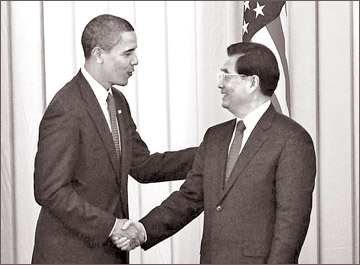Two great nations pay respect
Dr Mathu H Liyanage
In a rapidly changing world moving slightly away from traditional
values and ideologies, it was great to see leaders of two superpower
countries, Presidents Barack Obama of the United States and Hu Jintao of
China, meet together at a summit meeting held recently at the White
House to discuss problems common to both countries. It was followed by a
joint press conference, a rare concession afforded for a Chinese leader.
|

President Barack Obama and President Hu Jintao meet together |
On one side was the United States struggling with near-chronic
unemployment and a raging housing crisis while on the other side was
China that powered out of the global downturn and overturned Japan as
the world's largest economy next to the United States.
According to economic analyses, it is likely that trade and currency
disputes between the two countries are likely to intensify as China
draws closer to US economically in a decade or two.
More broadly, the discussions had focused on trade and currency
irritants, the pressing need to fight global terrorism and tackling the
international financial crisis.
The meeting of the two Presidents appears to be a project to rebuild
the image of strained ties in US-Chinese relations over the previous
year such as the imprisonment of the Nobel Peace winner Liu Xiaobo and
visits of Dalai Lama to the United States which were welcomed by the
government.
The "quintessentially American" dinner for the President Jintao at
the White House was, of course, completed with the traditional ice cream
and apple pie.
The guests included Hollywood A-listers, big business men and
prominent Chinese-Americans such as action film star Jackie Chan,
Barbara Streisand and figure skater Michelle Kwan.
The cries and chants of protestors outside over China's human rights
abuses including the imprisonment of Nobel Peace laureate Liu Xiaobo
were drowned by the 21-gun salute. Incidentally, Hu had openly admitted
that more needed to be done in China on human rights despite the
progress already made.
The bow of Obama in welcoming the Chinese President though had caused
a stir among the American people as a show of weakness and subservience
withered as it was considered to be a mark of respect commonly practised
in Asian and Southeast Asian countries.
The two countries have reached agreement on $44 billion worth of
export deals, including China's purchase of 200 Boeing airliners.
The contracts also included building a railway and hybrid bus that
are estimated to support about 235,000 jobs in 12 states.
In wrapping up the Chinese President Hu Jintao's visit to the United
States, he had mentioned at a luncheon meeting of American Executives
hosted jointly by the US-China Business Council comprising corporate
officials with business ties with China and the National Committee on
US-China Relations, a foreign relations policy group, that China-US
relations would enjoy smooth and steady growth when the two countries
handled well the issues involving each other's major interests.
Hu had further mentioned that China would remain committed to
peaceful development and would not follow an arms race and be a military
threat to any country nor pursue an expansionist policy.
Turning his attention to Taiwan and Tibet, he had pointed out that
those matters involved Chinese sovereignty and territorial integrity,
and national sentiments of 13 billion Chinese.
He had urged US to continue to recognise China's sovereignty over
Taiwan and Tibet.
The Chinese President had called for closer US-Chinese co-operation
in Southeast Asia and the Pacific Region to promote peace, stability and
prosperity and to work closely with each other on the basis of mutual
respect.
This historic summit meeting between Presidents of two superpower
countries would, no doubt, stabilize the need and show the importance of
co-operation and co-existence aimed at peace and prosperity. |



